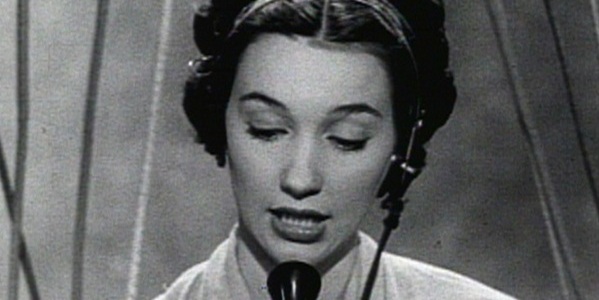
November 20, 2013, by Maggie
Doing the Business 2013 – Nalini by Day, Nancy by Night & The Phantom of the Operator
The following blog summarises Professor Laurie Cohen’s introduction to a double bill of films about working on the phones:
Both films, in their own ways, deal with the strictly managed regimes, the disembodiment and the identity transformations that such work involves. Nalini by Day, Nancy by Night, produced and written by Sonali Gulati, in 2005 focuses on the outsourcing and offshoring of telemarketing work to call centres in New Delhi. The Phantom of the Operator, produced and written by Caroline Martel, 2004 traces the development of the occupation of the telephone operator, in Canada from 1903 to 1989.
Gulati creates a montage of animation, live action and archival footage to explore globalisation, capitalism and identity. Martel uses footage from industrial, organizational and educational films highlighting the all important corporate setting in which these people worked and its long history. So although at first glance these settings might appear to be very different, they are actually remarkably similar.
Although disembodied, the operators are used as the organisation’s ‘public face’ – in Bell’s terms, the ‘voice with the smile’. This meant that only certain types of people were eligible. At Bell it was nice young women of good character – no Jews, no African Americans, no married women. The age band was narrow – 17-26. Women were expected to speak well – no foreign accents – and elocution lessons were part of the training. There were height requirements and dress codes.
In the Indian sector the typical recruit is a graduate in their early 20s. Ideally recruits would have been educated at English medium schools, and those with heavy regional accents are not sought after. Language and culture lessons are part of the training, particularly in the early years (and especially in call centres working for US clients) agents were expected to use American or English aliases.
In both settings operators or agents were expected to adhere to a script with no deviation losing the discretion evident in earlier roles, with the job becoming increasingly anonymous. In the early days of the telephone, customers were typically wealthy people who were used to domestic servants and they saw operators in this light. They often spoke harshly, but operators were not allowed to answer back. Same with call centre agents who regularly suffer customer abuse but with no possible recourse.
Principles of scientific management were rigorously applied to the early telephone sector – operators working to strict targets – 4 seconds to answer, 600 calls per hour at height. Consistent with scientific management, the management dimension also developed, with ever closer monitoring. Much like the modern day call centre with its targets, anonymity and constant surveillance
So remarkable similarities. But to my mind they also raise some very different questions.
In the off shoring space:
Is it a good or a bad thing?
Clearly there are different answers for different people: UK/US employees, Indian employees, senior level managers, board members, shareholders.
For Indian people the answer is full of contradictions: Yes it is a job, but what about learning and growth? Yes it is a job, but what about discretion? There are mixed reactions to identity transformation and evidence of colleagues treating international colleagues as scapegoats, taking advantage of cultural differences. But, my research has show there is some retaliation – many and frequent small acts of resistance – although these are not so apparent in film. Overall the feeling is that Gulati is relieved that it’s not quite the sweatshop she had envisaged.
How can we understand these new forms of organization?
With their Western appearances, structures and espoused cultures, ways and manners, language, HR routines, even names, are they a homogenizing force, so that wherever we go things look exactly the same (Tom Friedman’s The World is Flat), or are they about new forms of difference, about hybridity? Dead Ringers: how outsourcing is changing the way Indians understand themselves by Shehzhad Nadeem argues a combination – or synthesis
The films do not get into this final question, but it would be an intriguing sequel.
In the world of the telephone operator:
The question of visibility and invisibility, an issue that continues today.
The consequences of the short working life, we assume many stopped working when they married (same in Indian call-centres actually) but what of those who didn’t? Was there any sense of progression, or did they simply stick with the jobs they were doing?
One intriguing aspect just touched on by the film is how these jobs were marketed to other women. Glamourizing of ‘new’ forms of women’s employment (airline stewardess) in contrast to traditional teachers and nurses who were seen as worthy but not glamorous. Glamour did not enable career progression (although possibly did lead to a husband) – an interesting form of career capital for women at that time.
Overall one limitation to the film is that there were no women’s voices and no sense of resistance. It presented a very corporate view.
Finally Martel leaves us with the intriguing question, ‘who could ever have imagined that in designing the world as a network, we would end up inhabiting that network as a world?’
Doing the Business is a season of films exploring the role that social and ethical issues play in global business. The series continues at 6:00pm next Monday 25th November with the screening of Gasland II introduced by Daniel Nyberg, Professor of Sustainability at the ICCSR, Nottingham University Business School.
No comments yet, fill out a comment to be the first

Leave a Reply